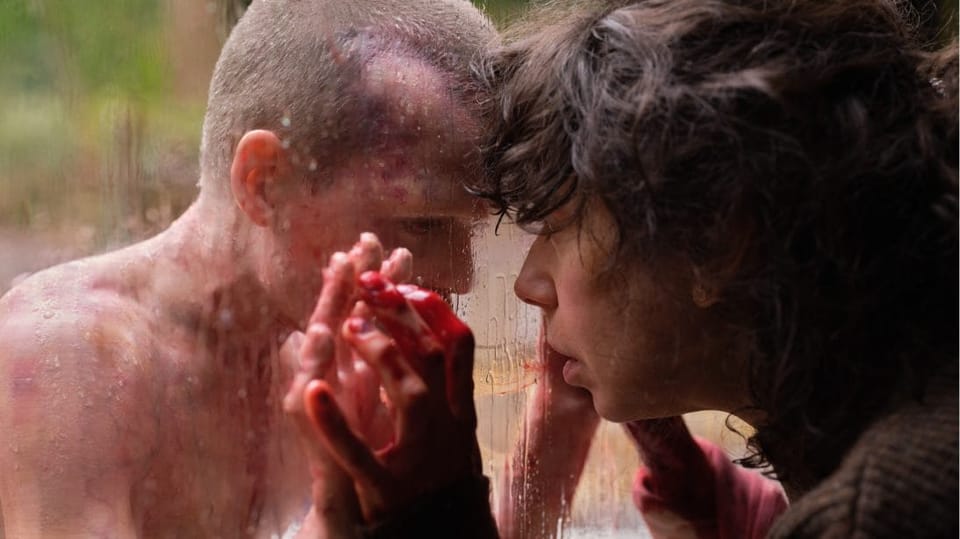New & now: Bring Her Back

I didn’t intend on seeing Bring Her Back and The Phoenician Scheme within less than 24 hours of each other. It just happened that way, like when I watched Santa Buddies (a Christmas movie with talking dogs) and Marriage Story back to back. Drastic vibe changes can be good sometimes, they keep you on your toes, like laughing at a funeral. Bring Her Back had me curling up like a shrimp in my seat, while The Phoenician Scheme was like relaxing in a nice, lightly scented bath.
Though they’ve only directed two feature films, Danny and Michael Philippou, like Wes Anderson, already have a distinct style and recurring themes. While Bring Her Back and its predecessor Talk to Me don’t feature the same characters, they’re very much of a piece, both involving young people so leveled by the unexpected loss of a parent that they eventually lose their grip on sanity, though in Bring Her Back that precarious state of mind is cleverly used to another character’s advantage.
Siblings Andy (Billy Barratt) and Piper (Sora Wong) are orphaned after their father dies suddenly. Still three months away from turning 18, Andy is too young to become Piper’s guardian, and the two enter foster care together, moving in with Laura (Sally Hawkins), a former youth counselor. Though Laura greets them both warmly, it’s obvious that Andy is an afterthought. She immediately gets his name wrong, and whereas Piper’s bedroom is an inviting space, his is a storage room with a mattress on the floor.
Laura’s interests lie solely with Piper, who’s visually impaired, and Ollie (Jonah Wren Phillips), the strange, mute young boy who also lives there. Laura lies to Piper about what Ollie looks like, and it’s just the beginning of her unsettling behavior. Some of it can be forgiven, as Laura, like Andy and Piper, has recently lost a loved one. Her daughter, Cathy, the same age as Piper (and also visually impaired), drowned, and though on the surface Laura is in high spirits, her sorrowful eyes and the late nights she spends watching old home movies suggest otherwise.
Other things are less easily excused, like her forcing Andy to kiss his father’s corpse at the funeral. She insists she’s just trying to help him process his loss, as when she gets him drunk and coaxes out of him that his father abused him as a child, and he’s long resented Piper for being the favored child. In a breathtakingly cruel (and very wily) act of gaslighting, however, Laura uses that information for a campaign to both turn Piper against Andy, and cause Andy, already haunted by nightmares about his father’s death, to question his sanity.
Though you can probably glean from the title of the film what this is all in service of, I shan’t spoil it. As with Stephen King’s Pet Sematary, what Laura’s grief drives her to do is horrifying, but when something so unnatural, so cosmically wrong as outliving your child happens, it becomes eerily understandable. Thanks to Hawkins’ powerful performance, we can see glimmers of the loving, quirky, fun mom Laura used to be, before grief corrupted her and turned her into the witch from “Hansel & Gretel,” luring children to her lair.
As in Talk to Me, tampering in the spiritual realm (more specifically, the opportunity to reconnect with a lost loved one) is both impossible to resist and inevitably leads to disastrous results. There are rules that must be followed, and when they’re broken, there’s a price to be paid, usually by a child. Here it’s Ollie, and not since The Exorcist has a kid been put through this level of visceral brutality. Mind you, no one actually puts their hands on him. He’s a conduit of sorts, and the side effects of that are…unpleasant1. I’m not the first person to note that there are thematic and stylistic similarities between Bring Her Back and Hereditary, and that includes sparing nothing in reminding the audience that none of us are safe from suffering, especially not the innocent.
Though the trailers (and even his introduction to the plot) would have you believe that Ollie is an antagonist, he’s perhaps the most tragic figure in the whole story. All of them are tragic, really: no one here is a one-note villain, or a personality-free hero. They’re victims of circumstance, and reacting to it in monstrous ways, despite not being monsters themselves.
Also as with Talk to Me, no time is wasted overexplaining things. If you don’t pay close attention to some of the videos Laura watches, you might not quite get what’s happening to Ollie. There’s no scene of Andy sitting in front of a microfiche machine, or talking to an occult expert about what might be going on. More ominously, there’s no way of knowing if there’s any turning back from this, a cure, something that can stop what’s happening.
The how of what Laura is doing doesn’t matter, only the why, and we already know why: grief, particularly when it’s hand-in-hand with guilt, twists us, turns our worlds upside down, and makes us think that there’s nothing we won’t do, no roads we won’t take, to make it right again. It’s hard to watch, but not hard to understand.
Avoid if you’re skittish about mouth injuries, because holy shit. ↩
Member discussion